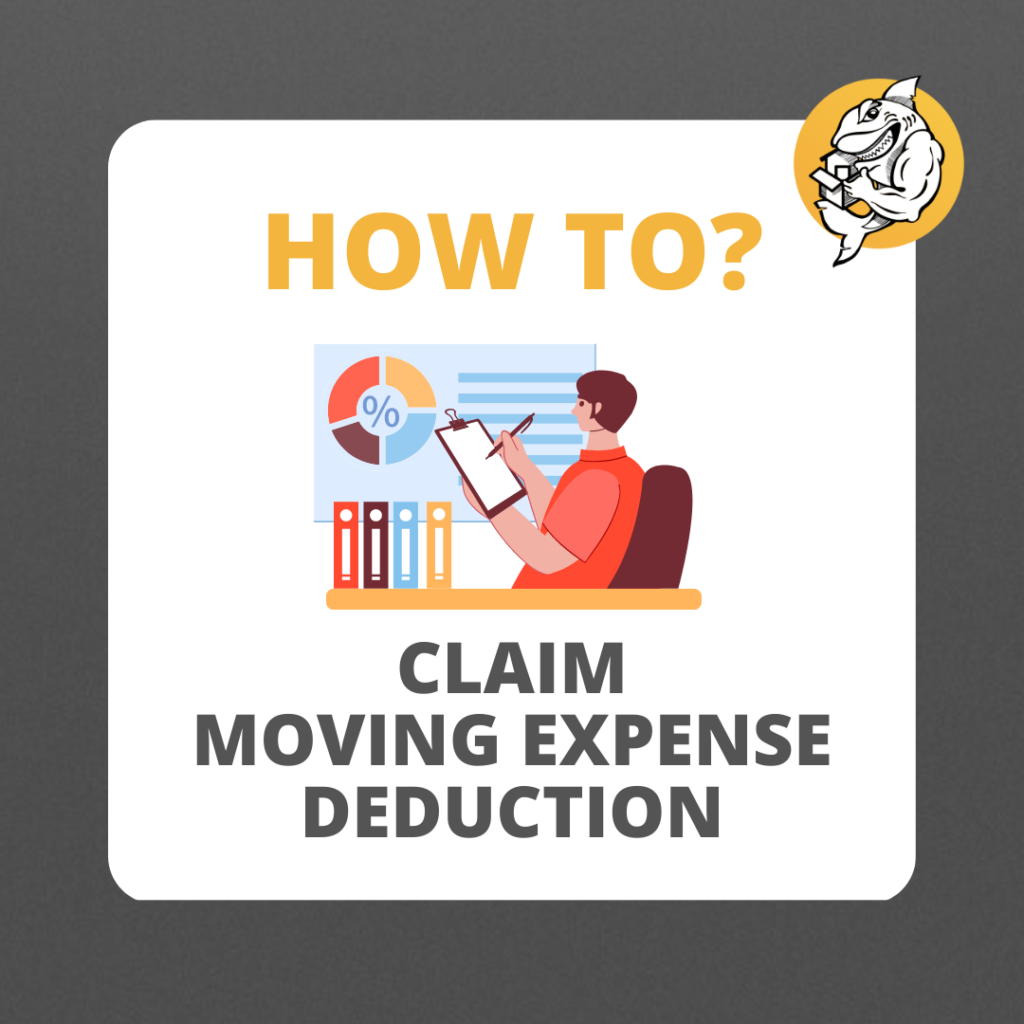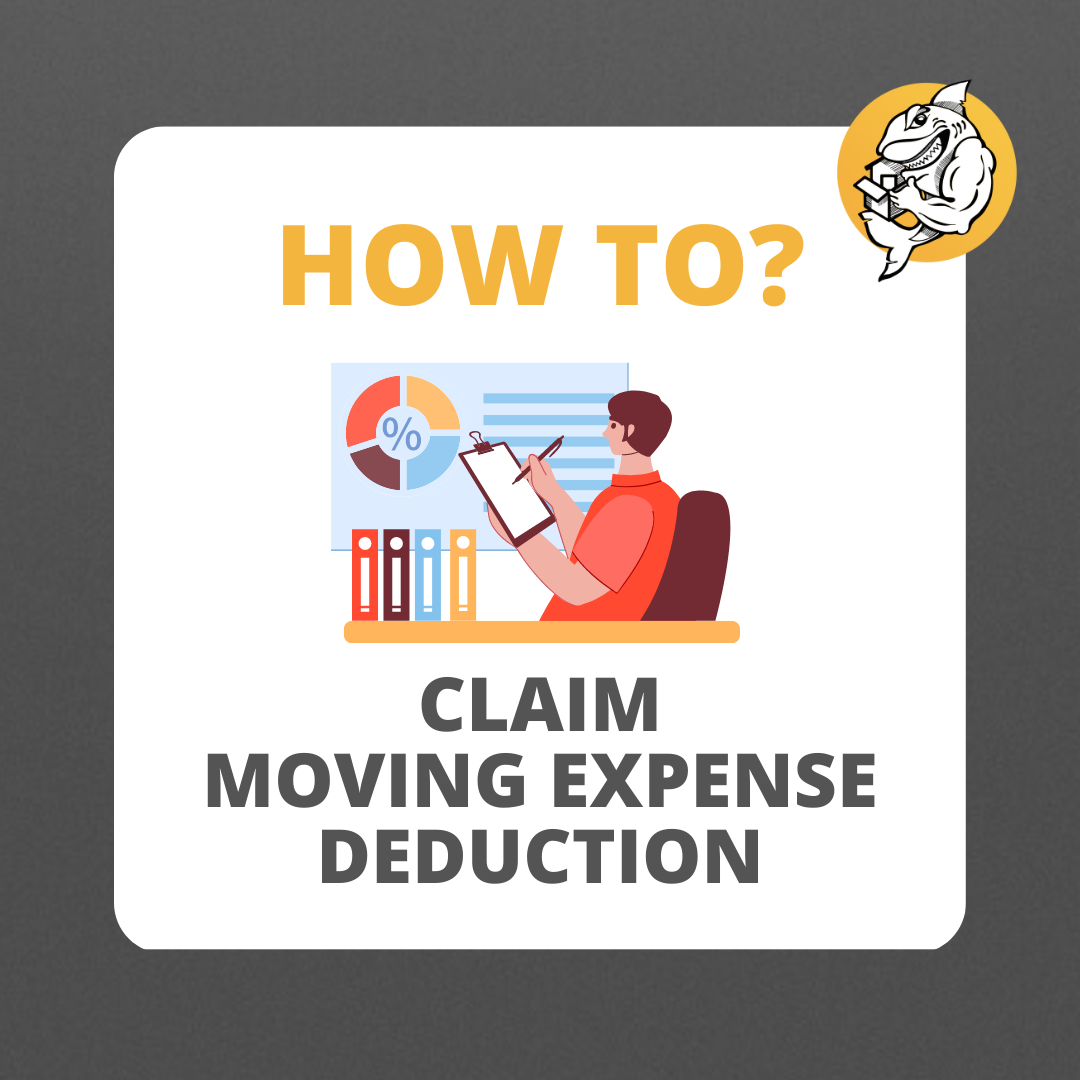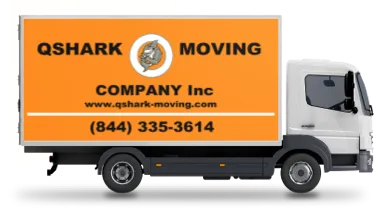By Uladzislau Kandybovich Qshark Moving Company CEO
Embrace new beginnings with confidence. At Qshark Moving Company, we’re committed to turning your moving challenges into a smooth and stress-free experience.
When it comes to relocating, whether it’s for a new job, a change of scenery, or other reasons, one of the top concerns is the cost of moving. In this comprehensive guide, we’ll explore the question: are moving expenses tax deductible? We’ll provide you with valuable insights and tips to help you save on your taxes and make the most of your moving experience. Let’s dive in!

Understanding Tax Deductible Moving Expenses
Moving expenses were once tax deductible for most taxpayers. However, the Tax Cuts and Jobs Act (TCJA) of 2017 changed the rules, significantly limiting the scope of this deduction. Currently, only active-duty members of the Armed Forces who are relocating due to a military order or a permanent change of station qualify for moving expense deductions. This change is in effect from 2018 until 2025, unless Congress decides to extend or modify it.
Qualifying for Moving Expense Deduction
Distance Test
To qualify for the moving expense deduction, the move must satisfy the distance test. This test requires that the distance from your new workplace to your old home must be at least 50 miles farther than the distance from your old workplace to your old home.
Time Test
In addition to the distance test, you must also meet the time test. This means you must work full-time for at least 39 weeks during the first 12 months after your move. This condition applies to both employees and self-employed individuals. For self-employed individuals, there’s an additional requirement of working full-time for at least 78 weeks during the first 24 months after the move.
Tax Deduction Eligibility for Moving Expenses
1. Are you an active-duty member of the U.S. military?
2. Are you relocating due to a permanent change of station?
3. Are your moving expenses reasonable and directly related to the relocation?
4. If yes, you may be eligible for tax deduction on moving expenses. Consult a tax professional for further guidance.
Eligible Moving Expenses
If you qualify for the moving expense deduction, the following expenses are eligible for deduction:
- Transportation and storage: You can deduct expenses related to moving your household goods and personal effects, including packing, crating, and transportation costs. You can also deduct the cost of storing your belongings for up to 30 days before the final move.
- Travel costs: Expenses for traveling from your old home to your new home are deductible. This includes lodging but excludes meals.
- Utility connection fees: The cost of connecting or disconnecting utilities in your old and new homes can be deducted.
- Vehicle expenses: If you use your vehicle for moving, you can deduct either the actual expenses or the standard mileage rate, which is adjusted annually by the IRS.
Non-Deductible Moving Expenses
The following expenses are not deductible, even if you qualify for the moving expense deduction:
- Meals: Costs of meals during your move are not deductible.
- House hunting: Expenses related to pre-move house hunting trips, such as travel and lodging, are not deductible.
- Temporary housing: The costs of temporary housing or living expenses incurred while waiting for your new home to be ready for occupancy are not deductible. 4. Real estate fees: Expenses related to the purchase or sale of your home, such as realtor fees, closing costs, and mortgage points, cannot be deducted.
- Loss on the sale of a home: If you experience a loss on the sale of your old home, this loss cannot be deducted as part of your moving expenses.
- Lease penalties: Penalties for breaking a lease on your old home are not deductible.
- Security deposits: Any costs associated with security deposits or forfeiting a security deposit are not deductible.
Deductible Moving Expenses
If you’re eligible for moving expense deductions (see above), you can deduct costs that involve the basic packing and transportation of your household belongings, and travel expenses.
| Packing and transportation | Travel |
|---|---|
| Packing and crating | Lodging |
| Insurance (30 days) | Airfare |
| Storage (30 days) | Car expenses (fuel costs) |
| Trailer rental |
Nondeductible Moving Expenses
You can’t deduct any of the following moving expenses:
- Any expenses that the government has reimbursed you for
- The value of services the government provided (like a housing or lodging allowance)
- Costs of meals while traveling
- “Lavish and extravagant lodging”
- Any expenses related to the sale, purchase, or rental of your home (like home improvements, mortgage fees, or security deposits)
- Money you lose from moving (breaking a lease, ending club memberships, etc.)
- Traveling and long-term storage fees that do not directly relate to the move

How to Claim Moving Expense Tax Deduction
If you’re eligible to claim moving expense deductions, follow these steps:
- Keep records: Maintain accurate records of your moving expenses, including receipts, bills, and mileage logs. This will help you accurately calculate your deductions and provide necessary documentation in case of an audit.
- Complete Form 3903: Use IRS Form 3903, Moving Expenses, to calculate your deductible moving expenses. This form will guide you through the process of determining which expenses qualify and how to calculate the total deductible amount.
- Report the deduction on Form 1040: Include the total deductible amount from Form 3903 on your individual income tax return, Form 1040, U.S. Individual Income Tax Return. Attach Form 3903 to your tax return when filing.
Special Circumstances and Exceptions
There are some special circumstances and exceptions to the moving expense deduction rules:
- Spouses and dependents: If you and your spouse both work and move together, you can combine your work weeks to satisfy the time test. However, each spouse must still meet the distance test individually. Expenses for moving dependents are also deductible, provided the move meets the distance and time tests.
- Surviving spouses: Surviving spouses who move within one year of the date of their spouse’s death due to a job-related reason can deduct moving expenses.
- Retirees: If you retire and move to a new location in the United States, you may be able to deduct moving expenses if you meet the distance and time tests before retirement.
- Members of the Armed Forces: As mentioned earlier, active-duty members of the Armed Forces who move due to a military order or a permanent change of station can deduct moving expenses without having to satisfy the distance and time tests.
Deduct Moving Expenses: Impact on Your Taxes
Deducting moving expenses can have a notable impact on your taxable income. By claiming these deductions, you effectively reduce your gross income for the tax year, which can lead to lower taxes owed. It’s essential to understand the Internal Revenue Service (IRS) guidelines for claiming moving expense deductions, as they are subject to change based on tax laws and regulations.
When filing your federal return, be sure to complete the appropriate IRS form, such as Form 3903, to claim your moving expense deductions. Keep in mind that these deductions are separate from the standard deduction, which is a fixed amount that taxpayers can subtract from their taxable income. Moreover, it’s important to consult your state tax return instructions, as state tax rules may vary when it comes to moving expense deductions.
By understanding the nuances of deducting moving expenses and working with a tax professional to ensure compliance with IRS and state tax guidelines, you can potentially reduce your tax liability and make your move more financially manageable.

Moving for Work: Costs and Considerations
Moving for work can be an exciting opportunity, but it also comes with various expenses. Storage costs, car expenses, moving costs, and hiring a moving company all factor into the overall cost of relocation. When planning a work-related move, it’s essential to be aware of which moving expenses qualify for tax deductions and which ones don’t.
To make your move as smooth as possible, consider hiring a reputable movers like Qshark Moving Company. Qshark offers a range of services to accommodate your moving needs, from local to long-distance moves. We provide detailed information on how much to tip your movers and share valuable advice on things to consider when you schedule your move. For long-distance moves, Qshark’s guide on long-distance moving costs is an invaluable resource for understanding and preparing for the expenses involved.
Planning and organizing your move can be overwhelming, but at Qshark we offer a wealth of resources to help you navigate the process. Their ultimate packing checklist ensures you don’t forget any essential items, while their guide on how to move out offers step-by-step instructions for a stress-free move. Visit Qshark Moving Company’s website for more information or to request a quote, and consult their Google Maps location for directions to their office.
By carefully considering your moving expenses and working with trusted movers like Qshark, you can make the transition to a new location for work as seamless and cost-effective as possible. Keep track of your moving expenses, consult with a tax professional if you have questions, and take advantage of the resources available to you to ensure a successful move.
Conclusion
While the moving expense deduction is currently limited to active-duty members of the Armed Forces, it’s essential to be aware of the rules and requirements if you qualify. By understanding which expenses are deductible and following the necessary steps to claim this deduction, you can save on your taxes and make your relocation more financially manageable. Remember to consult with a tax professional if you have questions or need assistance with your specific situation.



 How to Pack a Garage for Moving
How to Pack a Garage for Moving How to Pack a Desktop Computer for Moving
How to Pack a Desktop Computer for Moving How to Pack Wine Glasses for Moving
How to Pack Wine Glasses for Moving How to Pack Vinyl Records for Moving
How to Pack Vinyl Records for Moving How to Pack Wine Bottles for Moving
How to Pack Wine Bottles for Moving